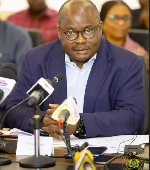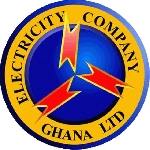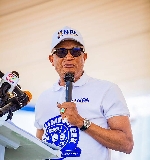Bulk oil distributors bare teeth at NPA for allowing foreigners into downstream sector
 Senyo Hosi is the CEO of the Ghana Chamber of Bulk Oil Distributors
Senyo Hosi is the CEO of the Ghana Chamber of Bulk Oil Distributors
The Ghana Chamber of Bulk Oil Distributors has said it has noticed with “great disappointment and displeasure, the failure of the National Petroleum Authority (NPA), to revise its licensing requirements to conform with the Ghanaian Content and Ghanaian Participation Policy for the Petroleum Downstream as finally approved by Cabinet in March 2019”.
A petition jointly signed by CEO Senyo Kwasi Hosi and Board Chair Ivy Apea Owusu and addressed to the Minister of Energy as well as the Board Chairman and CEO of the National Petroleum Authority dated 11 October 2021, said: “This is particularly regrettable given the compliance and implementation responsibilities assigned the NPA as encapsulated in Paragraphs 6.1 and 6.2.2 of the Ghanaian Content and Ghanaian Participation Policy approved by Cabinet”.
“We hereby humbly petition you to immediately remedy this situation and take steps to reverse any licensing decisions taken in breach of the policy since its approval by cabinet”, the petition said.
The Chamber noted that the policy, among others, contains “express provisions” on the Ghanaian content requirements for various activities in petroleum downstream including the following:
“1. Activities in the petroleum downstream sector such as trading and shipping (all activities and services included but not limited to vessel charter) of crude oil, Oil Trading, Bulk Oil Distribution, Oil Marketing and retailing of petroleum products at the retail outlets, etc. in the domestic market shall be reserved for licensed companies with a 100 per cent (100%) Ghanaian ownership. The activities are:
a) Trading of Crude Oil and refined Petroleum Products
b) Shipping of Crude Oil and Refined Petroleum Products
c) Distribution & Marketing of refined petroleum products”.
Read the rest of the statement below:
As you are aware, the indigenous players in the industry have evolved from kerosene resellers and agents of international traders to become successful entrepreneurs in the BDC, OMC and Storage sectors of the industry. You are also aware of the many desperate attempts by international traders seeking to integrate forward by becoming OMCs and BDCs to stifle the growth and backward integration of indigenous Ghanaian companies.
Nurturing the forward integration of IOTs through the non-enforcement of the Ghanaian Content and Ghanaian Participation Policy, will make it impossible to build Ghana’s own British Petroleum, Sahara, Vitol, Trafigura or Glencore. You may recall that when IOTs had an oligopoly on product supply in Ghana in the early 2000s, supply premiums were pegged at $105/mt but today, under indigenous BDCs, consumers pay supply premiums below $60/mt. As a matter of fact, through minority partnerships and golden shares by these IOTs, indigenous BDCs will be outcompeted to create an oligopoly run by IOTs in Ghana. We are certain that Ghana shall suffer pricing abuse under this phenomenon and will be heavily exposed on its product security. Posterity will not judge your regime right should this happen on your watch.
The continuous abuse of the Policy by the NPA is endangering the long-term sustainability of the OMC and BDC subsectors of the industry and betraying the confidence and trust of the industry. It must be noted that the effect of the policy is not necessarily dependent on the passing of a Legal Instrument but rather the administrative act of the NPA Board to revise and specify the licensing requirements. This is captured in section 14 of the NPA ACT691 which states “A licence shall not be granted to an applicant unless the applicant has complied with any other requirement specified by the Board and any other relevant enactment.” The inclusion of indigenous ownership has long been a licensing requirement for persons intending to participate in the downstream petroleum sector. The nature and extent of such indigenous inclusion have always been published by the Regulator by way of public notices and not Legislative Instruments.
Section four (4) of the NPA ACT subjects the NPA to the policy direction of the Minister. With the policy passed and legitimised by the cabinet, we respectfully hold the view that the NPA has acted and continues to act in breach of the law and policy.
H.E. Nana Akuffo-Addo, President of the Republic of Ghana, in a speech said, “We shall measure our progress by the happiness which our people take in being able to manage their own affairs.” It is our humble expectation that policy and regulatory actions, in respect of our petition, will preserve the President’s aspirations of delivering the commanding heights of our economy to Ghanaians. This will assure that the public commitments of the President in this regard will not be mere Speak-of-Poetry acted by Prose.
We will, therefore, take all necessary steps, including legal interventions, if necessary, to compel the NPA to comply with the directive and render null and void any licence issued in breach of the approved policy since its passing in March 2019. If any notice is required under Ghana law of our intention to engage other levers of government to compel fidelity to the law as contained in the Ghanaian Content and Ghanaian Participation Policy, consider this as that notice.
We count on your genuine commitment to Mother Ghana, to do what is not just in the myopic interest of a few but rather that which sets Ghana stronger for the future.
We remain.
Sincerely
Source: classfmonline.com
Trending Business

We won’t overburden Ghanaians with taxes – Amin Adam assures
11:26
IMF says Ghana's performance 'strong, most quantitative targets met'
02:02
Ghana’s foreign exchange reserves remains steady, reported at $6.2bn as of April 5 – BoG Governor at joint IMF, MoF presser
16:51
Madina market fire: Alan Kwadwo Kyerematen pledges to establish traders' bank to address their needs
02:37
Deloitte launches Technology, Media and Telecom predictions for 2024
13:05
YEA boss bemoans inadequate funding at Impact Hub in New York
12:40
₵5.8m dumsor fine 'unlawful, null, void'- ECG rejects PURC's ultra vires sanctions on board members
12:58
Ghana will have the lowest tax regime in ECOWAS – Alan Kyerematen
08:34
NPA urges users of LPG to accept Cylinder Recirculation Model
08:49
Transport fare hike: Don’t pay, it’s illegal – GPRTU to passengers
07:45



